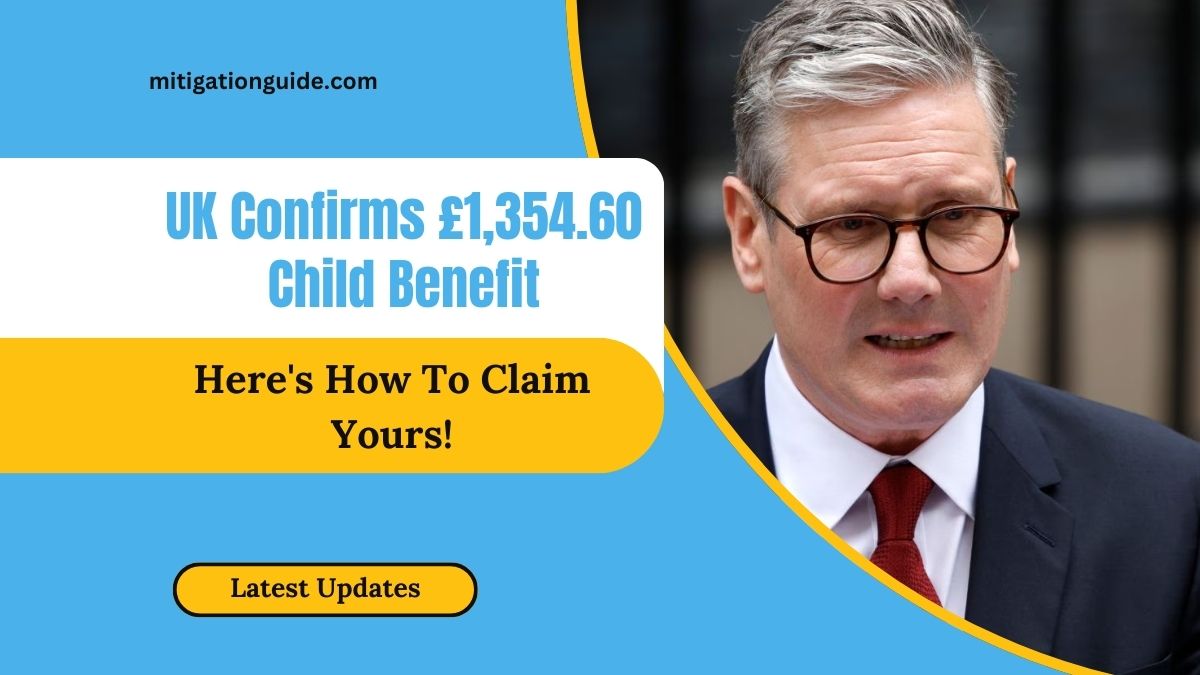The UK government has confirmed a welcomed boost for families: from 7 April 2025, the annual Child Benefit for the first child will increase to £1,354.60.
This rise is designed to help parents and guardians meet the rising cost of living while supporting the well-being of children across the UK.
This article explains everything you need to know about the updated rates, how to claim Child Benefit, who is eligible, and how to avoid missing out.
What Is Child Benefit?
Child Benefit is a regular payment made to parents or guardians who are responsible for raising a child under the age of 16 (or up to 20 if they remain in approved education or training).
It is a non-means-tested benefit, meaning you can claim it regardless of your income, although high earners may need to pay some back through the tax system.
Child Benefit Payment Rates from April 2025
The updated 2025–26 Child Benefit rates are as follows:
| Child | Weekly Rate | Annual Total |
|---|---|---|
| First or only child | £26.05 | £1,354.60 |
| Each additional child | £17.25 | £897.00 |
Payments are usually made every 4 weeks into your bank or building society account. If you’re a single parent or receive other qualifying benefits, you may request weekly payments.
Who Is Eligible?
To receive the Child Benefit, you must:
- Be responsible for a child under 16, or under 20 if they stay in full-time education or training.
- Live in the UK.
- Have the child living with you or be contributing significantly to their care.
- Ensure no one else is claiming the benefit for the same child.
Only one person can receive the benefit for a particular child, so families should decide who claims it.
How to Claim Your Child Benefit
Claiming is straightforward and should be done as soon as your child is born or starts living with you. The process includes:
- Register the birth of your child with the relevant UK authority.
- Complete the Child Benefit Claim Form (CH2) online or by post.
- Submit any supporting documents, such as your child’s birth certificate and your National Insurance number.
It’s important to apply within 3 months of the child’s birth or becoming responsible, as the claim can only be backdated up to 3 months.
High-Income Child Benefit Charge (HICBC)
If you or your partner earn over £60,000 a year, you may be required to repay some or all of your Child Benefit through a tax charge known as the High-Income Child Benefit Charge. Here’s how it works:
| Income Bracket | Impact |
|---|---|
| £50,000–£60,000 | Partial repayment of the benefit required |
| Over £60,000 | Full repayment of the benefit required |
You can either:
- Continue receiving Child Benefit and repay it through your Self Assessment tax return, or
- Opt out of payments but still register to protect your National Insurance credits.
Why You Should Still Claim
Even if you opt out of receiving the payment due to income, registering your claim is still important. This ensures you receive National Insurance credits, which can help protect your State Pension entitlements. It also ensures your child receives their National Insurance number automatically before turning 16.
The increase in Child Benefit to £1,354.60 per year for the first child in April 2025 marks a helpful step in supporting UK families.
Whether you’re welcoming a newborn or managing the cost of multiple children, this benefit provides regular, tax-free support to ease your household budget.
Stay on top of your claim, avoid delays, and make sure you’re getting what you’re entitled to—every pound counts when it comes to raising a family.
FAQs
Can both parents claim Child Benefit for the same child?
No, only one person can receive Child Benefit for each child, even if both parents are eligible.
Is Child Benefit affected by how much I earn?
The benefit is not means-tested, but if you or your partner earn over £60,000, you may have to repay some or all of it through the tax system.
What happens if I forget to claim within 3 months?
You can still claim, but you’ll only receive payments backdated up to 3 months from the date of your claim—so act quickly!
